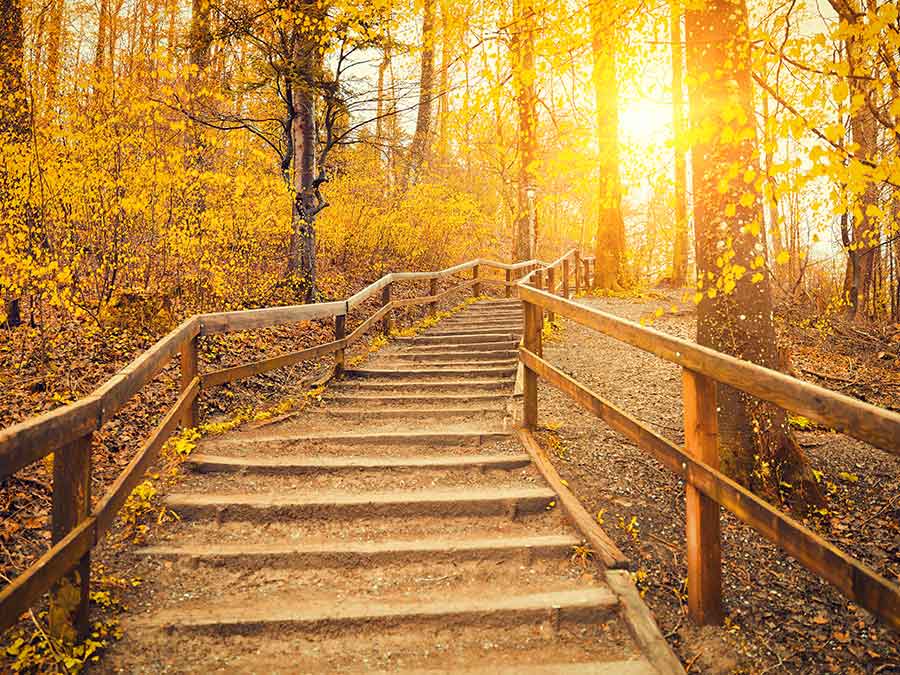
World’s best hikes
We’ve all seen towering mountain ranges, sweeping lakeside meadows and snow-covered forests. However, for most of us, these views come from our computer’s desktop screensaver.
For others, breathtaking scenery comes only after eight days of gruelling hiking up slippery trails. But the good news is, hiking holidays don’t have to be difficult.
Below we explore six of the world’s best hikes, with something for casual sightseers and serious adventurers alike.

Trails for the casual hiker
It’s not only the super-fit and fearless who can enjoy a great hiking experience overseas. These three hikes are bursting with natural beauty, without the threat of busting your back.

1. Gleninchaquin Park, Ireland
Gleninchaquin Park in Ireland’s Kerry County is a postcard-perfect oasis of green. Its sweeping valley of lush meadows and gentle slopes is believed to have been formed by glaciation around 70,000 years ago.
Today, Gleninchaquin Park is a popular destination for hikers who prefer a gentle stroll to a daring climb. Grazing sheep, bubbling streams and a picturesque waterfall make each of Gleninchaquin’s six walks a nature-lover’s fantasy.
There are even remains of ancient cooking sites along Gleninchaquin’s stream, revealing early settlement in the area.

2. Mount Takao, Japan
There’s no shortage of natural beauty to see in Japan, and with its gibbering monkeys and lush greenery, Mount Takao is no different. Just an hour from Tokyo, Mount Takao is a popular day trip for outdoor enthusiasts escaping the hustle and bustle of the city.
At its summit, Mount Takao boasts a serene Buddhist Shrine. Taking in the serene beauty here is the perfect way to rest your legs before beginning the descent.
Takao’s longest trail is a relatively short 16 kilometres, making it achievable to the more casual hikers among us. However, you won’t be climbing its gentle paved ascent alone - more than two and a half million tourists climb Mount Takao each year.
You may not be in danger of falling from a slippery mountainside on this easy hike, but the mass of distracted walkers means petty theft isn’t unheard of. Keep your bag in sight at all times; losing all of your hard-earned holiday snaps on your camera is an easy way to spoil a holiday.

3. Lower Yosemite Falls, U.S.A
Any serious nature lover will have Yosemite National Park high on their bucket list. However, you don’t have to be a serious hiker to enjoy its spectacular surroundings.
The Lower Yosemite Falls trail takes less than three kilometres from Yosemite Village, and ends at the fifth tallest waterfall in the world. According to The Yosemite National Park website, the waterfall is ten times taller than Niagra Falls and nearly twice as tall as the Empire State Building.
There are a number of great accommodation options in Yosemite Village, and several other easy ascents like the Lower Falls trail.

Trails for the serious hiker
For travellers with a few more miles under their belts, these three hiking trails will challenge and enchant. Proceed with caution; these trails aren’t for the faint of heart.
1. Acatenango Volcano, Guatemala
The awe-inspiring Acatenango Volcano trek offers a rewarding 1,2 or 3 day adventure for the serious hiker. Acatenango is a dormant volcano which last erupted in 1972, and is located in Guatemala.
Breathtaking panoramic views of the surrounding volcanic peaks, like Volcan Fuego and a fantastic glimpse into volcanic activity awaits at the end of this spectacular hike.
The journey to the summit is not for the faint hearted. You’ll be tested with steep inclines and rocky terrain which challenges the endurance of even the most serious hikers. Opt for a guided tour with a licensed tour provider if you don’t feel experienced enough to tackle this on your own, or, if you’re trekking alone, ensure to be extra prepared with the right clothing, equipment and safety devices.
The beauty of the Acatenango volcanic area is that there are many different trekking options to consider – the one day hike which will take you to base camp has fairly mild temperatures, and is still an accomplished adventure! If you’re wanting to go further, hiking up to the summit is your next step, where you’ll be rewarded with stunning views! At the top, it’s usually very windy and the weather can be unpredictable, so warm clothing is recommended.

2. Inca Trail to Machu Picchu, Peru
Peru’s famous Inca Trail is as scenic as it is challenging. The trail winds its way through the sweeping Andes mountain range, ending at the mountaintop ruins of Inca citadel, Machu Picchu.
However, reaching Machu Picchu is no easy feat. The hikers brave enough to take on the four to five-day Inca Trail are rewarded with the breathtaking views of mountainsides, cloud-forests, dense jungle and of course, historic Inca ruins. While there are shorter trails open to hikers, the ‘Classic Trail’ is by far the most popular.
History buffs and nature-lovers alike will be awestruck by the calm beauty of the Incan ruins dotting the trail. And if they don’t excite the senses, the unbelievable beauty of Machu Picchu never fails to take a traveller’s breath away (if they have any left!).
Walking the Inca Trail to Machu Picchu is wildly popular with travellers from around the world. However, the Peruvian government has wisely limited foot traffic on the trail (much of which is actually original Incan construction), to preserve its condition. Hikers must obtain a permit before climbing the Inca Trail, and these sell out quickly.
If you’re interested in tackling what is one of the most stunning outdoor experiences in the world, we recommend you seek a licensed tour operator who will secure your permit and ensure you climb the trail safely.
It’s easy to be swept away by the fascinating beauty of the Inca Trail and Machu Picchu, however like other hikes on this list, it isn’t an activity to be taken lightly. In addition to being incredibly physically demanding, the Inca Trail presents somewhat hidden dangers. Slips, trips and falls are the most common cause of injury on the trail, as well as the altitude, so ensure you are prepared.
Always follow the instructions of guides, stay within any marked boundaries and enjoy the scenery from within the allowed areas.

3. Grand Canyon Rim-to-Rim, U.S.A
The Grand Canyon in Arizona is one of the United States’ finest natural attractions. Almost five million tourists visit the Grand Canyon each year, however those who have hiked the rim-to-rim trail say the real beauty lies beyond the souvenir shops at the lookouts.
The Grand Canyon rim-to-rim trail begins at the North Rim, descends 6,000 feet to the bottom of the canyon, snakes along the stunning Colorado River before a leg-burning ascent up the South Rim.
Some trails in the area can be achieved in one day, however the National Park Service urges hikers to consider the risks of pushing the limits. “The difference between a great adventure in Grand Canyon and a trip to the hospital (or worse) is up to YOU,” their website reads.
The National Park Service offer great ‘Hike Smart’ guides for both summer and winter adventures, which outline the bare necessities of staying safe during a Grand Canyon Adventure.
Remember to stay hydrated, especially in the often-hot climate, and apply sunscreen throughout your hike. Keep an eye out for animals on the trail and be sure to not disturb them.
Again, being over-researched and over-prepared for your hiking trip will give you the best chance to soak in the scenery without seeing the inside of an ambulance.
If you’re planning a hiking holiday, it’s important to remember that there are some scenarios that wouldn’t be covered by our International Comprehensive travel insurance policy, such as:
- Mountaineering using ropes or rock climbing equipment
- Hiking above altitudes of 3,000 metres
- Hiking between 1,500 and 3,000 metres where ascending more than 500 metres per day
- Hiking that requires the use of specialist climbing equipment
If you have any questions about cover under our policy, please contact us at [email protected].
The content of this article is general and provided for information purposes only. Southern Cross Travel Insurance (SCTI) doesn’t guarantee or warrant the accuracy, completeness or currency of any article.
This article may contain hyperlinks to other websites owned or operated by third parties, or references to third party products or services. SCTI isn’t responsible for, and makes no recommendation about, the content or accuracy of any third party website, or for the suitability or performance of any product or service. The inclusion of a link in this article doesn’t imply that SCTI endorses the website or third party product/service.





